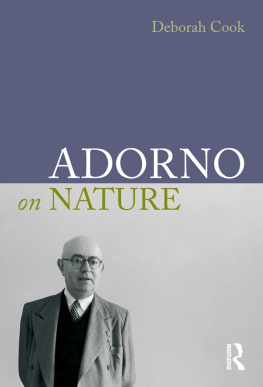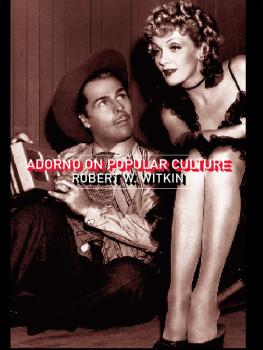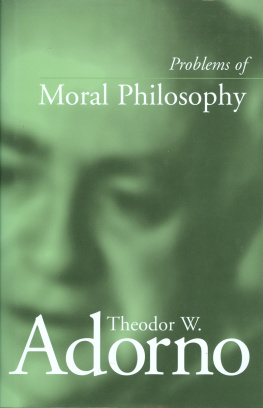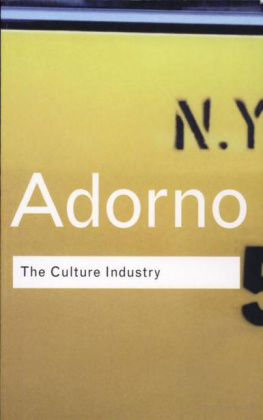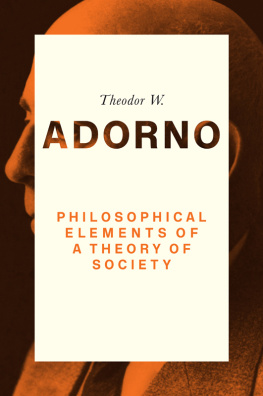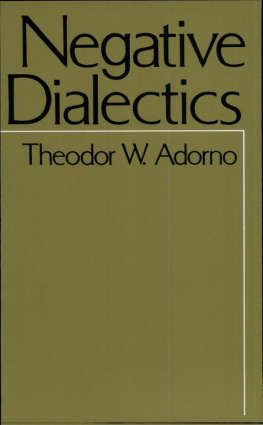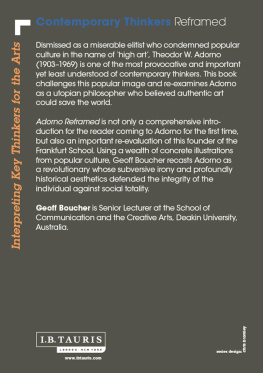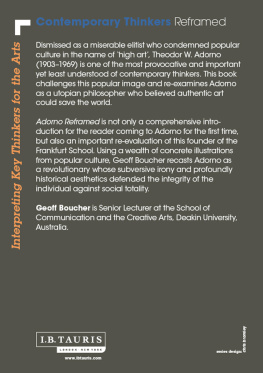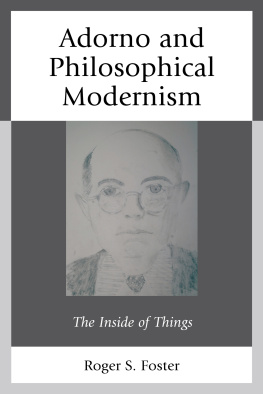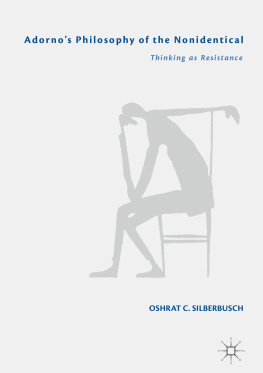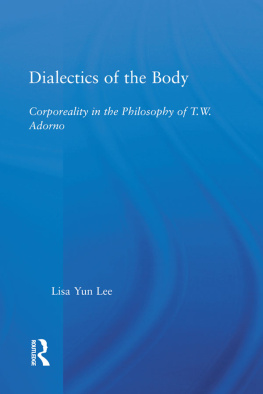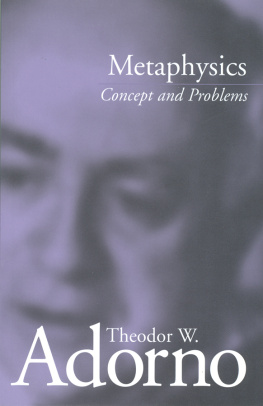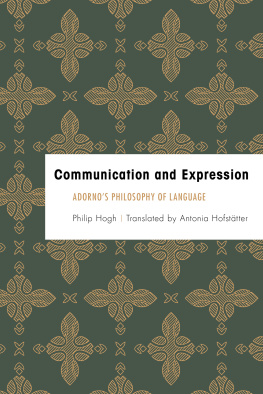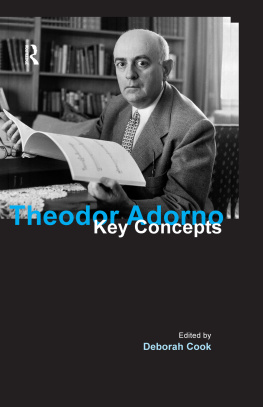ADORNO ON NATURE
First published 2011 by Acumen
Published 2014 by Routledge
2 Park Square, Milton Park, Abingdon, Oxon OX14 4RN
711 Third Avenue, New York, NY 10017, USA
Routledge is an imprint of the Taylor & Francis Group, an informa business
2011 Deborah Cook
This book is copyright under the Berne Convention.
No reproduction without permission.
All rights reserved. No part of this book may be reprinted or reproduced or utilised in any form or by any electronic, mechanical, or other means, now known or hereafter invented, including photocopying and recording, or in any information storage or retrieval system, without permission in writing from the publishers.
Notices
Practitioners and researchers must always rely on their own experience and knowledge in evaluating and using any information, methods, compounds, or experiments described herein. In using such information or methods they should be mindful of their own safety and the safety of others, including parties for whom they have a professional responsibility.
To the fullest extent of the law, neither the Publisher nor the authors, contributors, or editors, assume any liability for any injury and/or damage to persons or property as a matter of products liability, negligence or otherwise, or from any use or operation of any methods, products, instructions, or ideas contained in the material herein.
ISBN: 978-1-84465-255-6 (hardcover)
ISBN: 978-1-84465-262-4 (paperback)
British Library Cataloguing-in-Publication Data
A catalogue record for this book is available from the British Library.
CONTENTS
The first four chapters of this book originated as pilot essays that were subsequently expanded and extensively revised. is based, was published in Philosophy Today (2) (2008), 17387. I am grateful to the anonymous reviewers of these essays for their critical commentary.
Parts of Adornoon Nature were presented at to Alison, John, Michael, Eric and Samir for their critical support.
My colleague Jeffrey Noonan read versions of most of the chapters and obliged me to think more critically about Adornos views on political praxis. I continue to defend these views but, by opposing them, Jeffrey prompted me to find better arguments in their defence. Two of my students, Jeffrey Renaud and Michael Walschots, deserve special mention for their comments on the manuscript at various stages of its development. In the face of the setbacks, extensive revisions and surprising metamorphoses that accompanied the writing of this book, Jeffrey and Michaels unwavering enthusiasm was a constant source of encouragement.
A Humanities Research Group Fellowship at the University of Windsor allowed me to work uninterruptedly on the last chapter of this book during the winter semester of 2009. Affording me the irreplaceable luxury of time for reflection, the fellowship also gave me the opportunity to present to students, professors and the wider public a distillation of some of the central ideas in this book. The lively discussion that followed my presentation only confirmed my view that Adorno remains relevant for understanding our current predicament. Finally, a sabbatical leave made it possible for me to bring Adorno on Nature to completion.
I dedicate this book to my former thesis supervisor, the Adorno scholar and editor at 10/18, Olivier Revault dAllonnes. An unrepentant soixante-huitard, he spoke out courageously against oppression and exploitation, while actively supporting those who work for social change. May his example survive him in the environmental movement and beyond.
| AT | Aesthetic Theory (1997). |
| DE | Dialectic of Enlightenment (tr. Cummings, 1972)/Dialectic of Enlightenment: Philosophical Fragments (tr. Jephcott, 2002). |
| HF | History and Freedom: Lectures 19641965 (2006). |
| KCPR | Kants Critique of Pure Reason (2001). |
| MCP | Metaphysics: Concept and Problems (2001). |
| MM | Minima Moralia: Reflections from Damaged Life (1974). |
| MTP | Marginalia to Theory and Praxis (1998). |
| ND | Negative Dialectics (1973). |
| P | Progress (1998). |
| PMP | Problems of Moral Philosophy (2000). |
| PT2 | Philosophische Terminologie zur Einleitung [Introduction to philosophical terminology], vol. 2 (1974). |
| RCT | Reflections on Class Theory (2003). |
| SO | On Subject and Object (1998). |
[I]t would be up to thought to see all nature, and whatever would install itself as such, as history, and all history as nature.
Theodor W. Adorno (ND 359)
Decades before the environmental movement emerged in the 1960s, Theodor W. Adorno criticized our destructive and self-destructive relation to nature with the ultimate aim of reshaping that relationship in more nature evolves and constantly changes, but because it has been profoundly often negatively affected by human history. Adornos idea of natural history reveals the dynamic, and potentially catastrophic, interaction between nature and history.
When philosophy reads nature from history, the idea of natural history becomes the canon of interpretation for philosophers of history (ND 359; see driven domination of nature. Human history remains under the spell of blind nature in the form of the unbridled instinct for self-preservation (HF 124).
Conversely, when history is read from nature, nature appears as a sign for history (2006b: 264). Natures historical character is evident in the growth, maturation and decline of natural things, but history also leaves its mark on nature when we treat natural things instrumentally and reduce them to their exchange value in the capitalist marketplace. Exchange relations damage human beings as well by expunging differences between them in order to make nonidentical individuals and performances become commensurable and identical (ND 146). This damage has only been exacerbated by the forced renunciation of our internal nature in the form of needs and drives. On this point, Adorno largely agrees with Sigmund Freud: our history can be read in the increasingly aggressive behaviours to which civilization gives rise when it demands that we constantly exercise rational control over ourselves and over external nature. More critical than Freud, however, Adorno goes on to observe that the balance sheet which forms the foundation of this entire calculus of the renunciation of instinct and the domination of nature can never be presented because if it were presented, the irrational aspect of that rationality would become inescapably visible (PMP 139).
A thoroughly critical concept (HF 116), the idea of natural history makes visible the damage that has been inflicted on both human and nonhuman nature by our compulsive In fact, the idea of natural history complements Adornos thesis about the weightiness of the objective world because it affirms the preponderance of first and second nature over individuals as it explores their unending entwinement (ND 358).
The preponderant objective world is not a mere reflection of mind or spirit. Instead, nature and history are resoundingly real; they are powerful ends with the claim developed in subsequent chapters that Adornos non-reductive and non-dualistic idea of natural history may help to solve Kants antinomy of causality and freedom.
and thwarted its internal development, I also ask what nature might signify when I assess two attempts to make sense of this concept.
Next page
